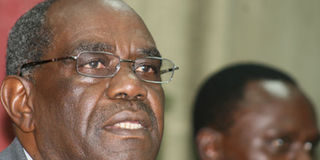Poll body erred on new vote zones, House told

PHOTO | FILE
Defence assistant minister David Musila.
What you need to know:
- Commission asked to explain why it used a draft Bill as the basis for delimitation
The electoral commission flouted the law in the delimitation of boundaries, Parliament has been told.
Defence assistant minister David Musila asked the Independent Electoral and Boundaries Commission to explain why it used a draft Bill as the basis for the delimitation.
Mr Musila, the Mwingi South MP, said that the commission erred in capping the wards at 1,450 when the figure was just a proposal in the County Governments Bill, 2012. (READ: Boundaries: Fresh battle looms in House)
“They did that without a legal framework and yet this House is now being asked to rubberstamp it,” Mr Musila said as he contributed to the Bill.
The proposed law will prepare the ground for the running of devolved units in the 47 counties.
“There are too many disparities in the way the laws have been formulated,” Mr Musila said.
He said the delimitation of counties as recommended by the National Task Force on Devolved Governments, which capped county wards at 1,450, was “unfair”.
The report on boundaries for the wards and constituencies is with the Justice and Legal Affairs committee.
He proposed changes to the Bill to ensure the county public service was obligated to employ qualified personnel at the grassroots so that “the people at the grassroots have access to quality service”.
Submit amendments
The debate on the Bill was concluded yesterday with a call to MPs to submit amendments to the Bill as soon as possible to allow the government to tighten the loose ends that the lawmakers had pointed out in the debate that spanned four days.
The conclusion of debate on the Bill opens the door for MPs to amend it, then have it go through the Third Reading (final approval of the Bill with or without amendments) and send it to the President for assent.
Deputy Prime Minister Musalia Mudavadi said the House had added value to the Bill and asked them to expedite the submission of the amendments, now that the constitutional deadline was just five days away.
Mr Erastus Mureithi (Ol Kalou), Mr Calist Mwatela (Wundanyi), Mr Sospeter Ojaamong’ (Amagoro), Dr Naomi Shabaan (Taveta), Mr Maina Kamau (Kandara) and Lewis Nguyai (Kabete) all supported the Bill saying it had covered all the bases to ensure a fruitful devolution of power and resources to the grassroots.
However, while Mr Mureithi pushed for the counties to be obligated to align their development plans to the national development roadmap –the Vision 2030; his Kandara colleague pushed for the government to allocate a minimum of 20 per cent of national revenue to the counties.
Mr Kamau said the 15 per cent minimum prescribed by the Constitution was a little low, and thus the law ought to make it clear that the government has to increase the allocation to ensure meaningful development at the grassroots.
“It is not clear who will be in charge of CDF (constituency development fund). We need an assurance that the CDF will be there, so that as MPs, we’ll still have something to do at the county level,” said Mr Kamau. He pushed for the Bill to cap the maximum age of anyone to be elected governor at 55 years, saying the post needs “someone who can run around”.
Mr Nguyai, the assistant minister of Local Government, said the Bill had “enough checks and balances to ensure that the county representatives to not bully the governor”, when it came to removal of the governor.
Other issues that MPs pointed out was a call to have the Tenth Parliament write the procedure and rules for the county assemblies to conduct their debates, and have these approved before the next General Election.




